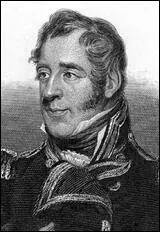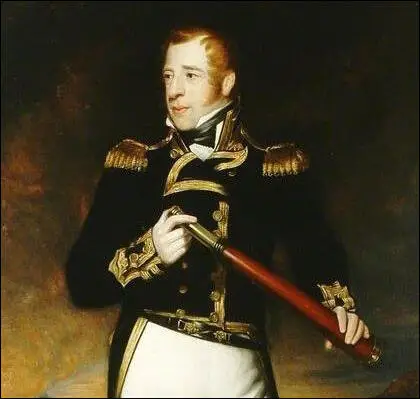Thomas Cochrane

Thomas Alexander Cochrane, the son of the ninth Earl of Dundonald, was born in Annsfield, Lanarkshire in 1775. He was educated at home and after a brief spell at the Chauvet Military Academy in London, he joined the Royal Navy. Cochrane became captain of H.M.S. Speedy in 1800 and he soon established a reputation for his daring and brilliant seamanship against the French Navy. Cochrane came into conflict with the authorities when they refused to support his campaign against corruption in the navy.
In 1805 he was a candidate for the parliamentary seat in Honiton. He recorded in his autobiography: "To the intense disgust of the majority of the electors, I refused to bribe at all, announcing my determination to 'stand on patriotic principles' which, in the electioneering parlance of those days, meant 'no bribery'. To my astonishment, however, a considerable number of the respectable inhabitants voted in my favour. Having had decisive proof as to the nature of Honiton politics, I made up my mind that the next time there was a vacancy in the borough, the seat should be mine without bribery. Accordingly, immediately after my defeat, I sent the bellman round the town, having first primed him with an appropriate speech, intimating that 'all who had voted for me, might repair to my agent and receive ten pounds ten.' The novelty of a defeated candidate paying double the current price expended by the successful one made a great sensation. The impression produced was simply this - that if I gave ten guineas for being beaten, my opponent had not paid half enough for being elected."
In 1806 Thomas Cochrane met the radical journalist William Cobbett, who had also been involved in attempting to expose corruption in the armed forces. The two men became close friends and Cobbett encouraged Cochrane to win election to the House of Commons where he would have an opportunity to expose those members of the armed forces who were misusing their power.
Cochrane was elected to represent Honiton in 1806. However, Cochrane's ideas were too progressive for the electors of Honiton and in 1807 he decided to accept the invitation to stand with Sir Francis Burdett as one of the two Radical candidates for the Westminster constituency.
and Thomas Cochrane are at the top of the poll and are followed by
the defeated candidates in the election.
After his election to the House of Commons Captain Cochrane spent much of his time at sea in the war against the French. When in Parliament, Cochrane made several speeches attacking corruption in the Royal Navy. The naval authorities were furious with Cochrane and he was demoted. Aware that he had lost the opportunity of advancing his naval career, Cochrane concentrated his efforts on campaigning for parliamentary reform.
Cochrane warned other MPs of the danger of revolution: "If the House does not reform itself, it will be reformed from outside with a vengeance." He urged them to reconsider their basic values: "Loyalty to the family must be merged into loyalty to the community, loyalty to the community into loyalty to the nation, and loyalty to the nation into loyalty to mankind. The citizen of the future must be a citizen of the world."
In 1814 Cochrane was accused with his uncle and his stockbroker of fraud on the stock market. Cochrane claimed he had been framed but he was found guilty of fraud and sentenced to a year's imprisonment, a fine of £1,000 and two hours in the pillory. When Sir Francis Burdett threatened to stand next to Cochrane in the pillory, this part of the sentence was withdrawn to avoid a riot taking place.
After his release from prison Cochrane gave support to Major John Cartwright and the formation of the Hampden Clubs. He also argued in favour of universal suffrage and spoke against the Gagging Acts.Cochrane once said: "If the individual is to be happy in the contemporary order, he must be open-minded with respect to new values and new arrangements."
In 1818 Cochrane resigned from the House of Commons and took up an appointment as commander of the Chilean Navy. After periods working for the governments of Peru and Brazil, Cochrane took command of the naval force that had been formed to assist the liberation of Greece.

In 1831 Thomas Cochrane became the tenth Earl of Dundonald. The following year, King William IV awarded him a free pardon for his alleged role in the 1814 stock market fraud. He was also reinstated as a Rear Admiral in the Royal Navy.
Thomas Cochrane, Earl of Dundonald, died on 31st October 1860.
Primary Sources
(1) In his autobiography, Thomas Cochrane described how his defeat in the 1805 Honiton election led to his victory in the following year.
To the intense disgust of the majority of the electors, I refused to bribe at all, announcing my determination to "stand on patriotic principles' which, in the electioneering parlance of those days, meant 'no bribery'. To my astonishment, however, a considerable number of the respectable inhabitants voted in my favour.
Having had decisive proof as to the nature of Honiton politics, I made up my mind that the next time there was a vacancy in the borough, the seat should be mine without bribery. Accordingly, immediately after my defeat, I sent the bellman round the town, having first primed him with an appropriate speech, intimating that "all who had voted for me, might repair to my agent and receive ten pounds ten." The novelty of a defeated candidate paying double the current price expended by the successful one made a great sensation. The impression produced was simply this - that if I gave ten guineas for being beaten, my opponent had not paid half enough for being elected.
(2) Thomas Cochrane, quotations (1805-1860)
Loyalty to the family must be merged into loyalty to the community, loyalty to the community into loyalty to the nation, and loyalty to the nation into loyalty to mankind. The citizen of the future must be a citizen of the world.
If the individual is to be happy in the contemporary order, he must be open-minded with respect to new values and new arrangements.
Relativity must replace absolutism in the realm of morals as well as in the spheres of physics and biology.
If the House does not reform itself, it will be reformed from outside with a vengeance.
You know that independence is purchased at the point of the bayonet. Know also that liberty is founded on good faith, and on the laws of honor, and that those who infringe upon these, are your only enemies, amongst whom you will never find Lord Cochrane.
A British nobleman is a free man, and therefore has a right to adopt any country which is endeavoring to reestablish the rights of aggrieved humanity.

